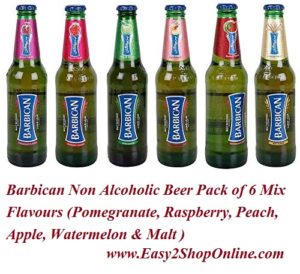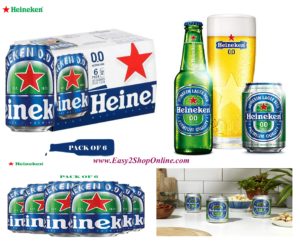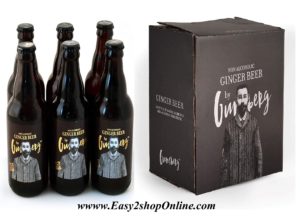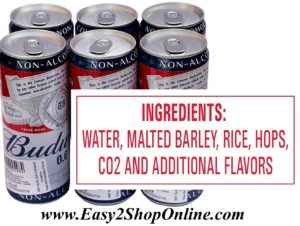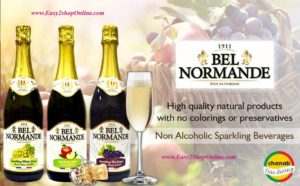Truth behind so called Non alcoholic beverages, having enough alcohol to start addiction, better to stay away from such drinks and beverages.
Non Alcoholic Beverages, Beers & Wines
Nonalcoholic drinks contain little or no alcohol. Beer, wine and mixed drinks have nonalcoholic versions for people seeking the flavor of a cocktail without the accompanying buzz or hangover.
Nonalcoholic drinks could prove beneficial for recovering alcoholics looking for sober drinking options. However, some say the cons of these beverages far outweigh the pros.
Nonalcoholic beverages are divided into two hallmark categories:
low-alcohol and alcohol-free.
Low-Alcohol:
By definition, a low-alcoholic drink contains less than 0.5 percent alcohol by volume (ABV).
These drinks are ideal for moderate drinkers without health problems. The odds of becoming inebriated from a low-alcohol beverage are slim.
Alcohol-Free:
Alcohol-free drinks contain no alcohol. Everyone from designated drivers to pregnant women can consume these beverages, avoiding the risks involved with alcohol. They are the preferred option for those looking to avoid alcohol altogether, including recovering alcoholics.
Benefits of Nonalcoholic Drinks
Dr. Elizabeth Hartney, a licensed psychologist who specializes in addiction, says that alcohol-free beverages are a good option for individuals transitioning away from alcohol.
For moderate drinkers, nonalcoholic beverages could prove helpful. Instead of having a couple of beers each day after work, individuals can drink a low-alcohol version with similar qualities. This could help stave off long-term problems, including addiction.
On the surface, nonalcoholic beverages seem like a safe alternative to the real thing — especially for those in recovery. However, critics have argued to the contrary.
Drawbacks of Nonalcoholic Drinks
For recovering addicts, nonalcoholic drinks are a slippery slope. On one hand, it’s rare to reach intoxication by drinking low-alcohol beverages and impossible with alcohol-free drinks. On the other hand, it could reintroduce users to alcohol.
Placebo Effects
A study published by Alcoholism: Clinical & Experimental noted how drinking alcohol releases a chemical in the brain called dopamine, which produces pleasure. The anticipation of alcohol could yield the same reaction.
Placebo effects, as these are called, can be experienced without actually consuming alcohol. Therefore, the smell and consistency of a nonalcoholic beverage could take a person back to a time before recovery — when alcohol dictated life choices. These drinks could spur cravings and give way to relapse.
Expectancy
Those who drink alcohol expect to feel its effects. This expectation can occur when a recovering alcoholic simply sips a nonalcoholic drink. Alcohol is not entering his system, but he may subconsciously seek a buzz.
Types of Nonalcoholic Beverages
Alcohol addiction is a debilitating disease that affects millions of Americans each year. For those in recovery, a single drink could cause relapse.
These individuals often turn to a range of nonalcoholic beverages instead. Many forms exist, giving those in recovery a variety of options based on their preference.
Low-Alcohol Options
For those who are not concerned about the effects of a low-alcohol drink, there are some options available.
Beer
Nonalcoholic beer is boiled to reduce its alcohol content. Billions of liters are consumed each year, making these brews the fastest-growing category of nonalcoholic beverages, per The Economist.
Wine
Low-alcohol wine, specifically red wine, contains several health benefits. Its antioxidants could help prevent heart disease and artery damage. Plus, these nonalcoholic options boast many of the same aromas found in regular wine.
Alcohol-Free Options
Alcohol-free drinks present no risk of intoxication, but there are potential negative consequences. If you have determined that these drinks are not a threat to your sobriety, try some of these alcohol-free alternatives.
Mixed Drinks
Nonalcoholic mixed beverages, or “virgin drinks,” are common nonalcoholic options. These could include juices, sparkling water and soda. For example, instead of a traditional bloody mary, individuals could mix tomato juice with a dash of Worcestershire and Tabasco sauce, topped off with a lemon.
Cocktails
Virgin cocktails, or “mocktails,” are healthy alternative for breakfast, lunch or dinner parties. A popular option is the Shirley Temple, which includes lemon-lime soda, ginger ale, a dash of grenadine and a cherry on top.
Other alternatives
Of course, water is by far the best alternative to alcoholic beverages, and green tea has a host of health benefits.
Water
Water is essential for those in recovery. In some settings, water mixed with diet soda or juice could give off the impression of alcohol and reduce social drinking discomfort.
Coffee
Coffee contains the most prevalent drug in the world: caffeine. However, a simple cup of joe is relatively harmless for recovering alcoholics.
Tea
Tea, particularly green tea, is a healthy option for those in recovery. Harvard University studies suggest coffee and tea reduce the chance for diabetes and cardiovascular disease.
Are Energy Drinks an Option?
In recent years, energy drinks have boomed in popularity. These beverages contain healthy ingredients, such as vitamins and herbs but also heavy amounts of caffeine. In fact, a typical energy drink may have as much caffeine as a cup of coffee.
The popularity of energy drinks has led to the creation of alcohol-filled energy drinks. These contain up to 12 percent alcohol by volume (ABV), nearly double that of a standard beer. They are consumed by 31 percent of teenagers and 34 percent of young adults, according to the National Council on Alcoholism and Drug Dependence.
For recovering alcoholics, energy drinks can be problematic. A study by the University of Maryland and Johns Hopkins University confirmed that energy drink consumption can lead to alcohol abuse.
Seek Professional Advice
Before trying nonalcoholic beverages, speak with a medical expert who can further explain the pros and cons of these drinks and advise whether they would be counterproductive to you and your situation.

